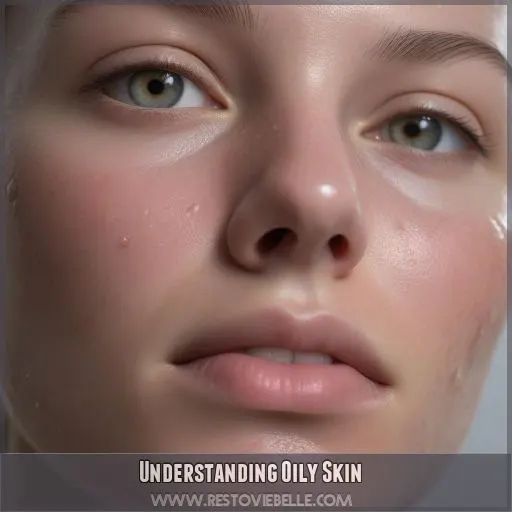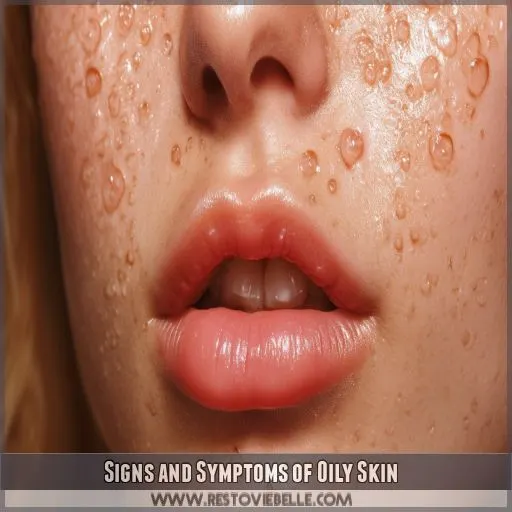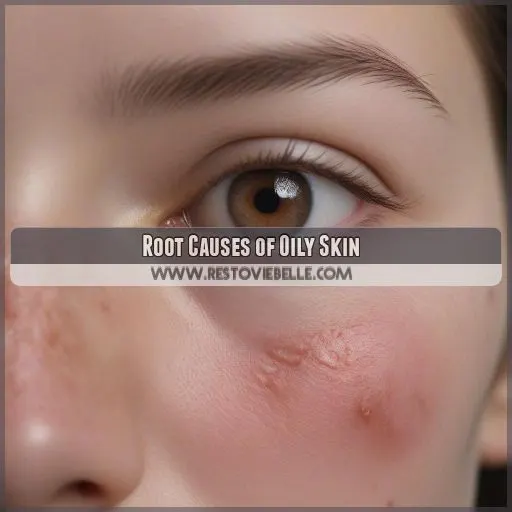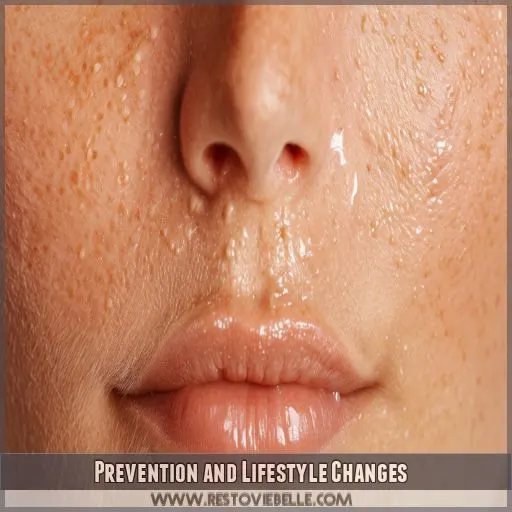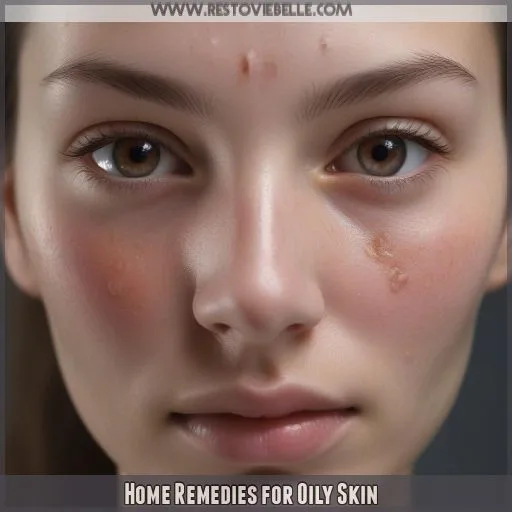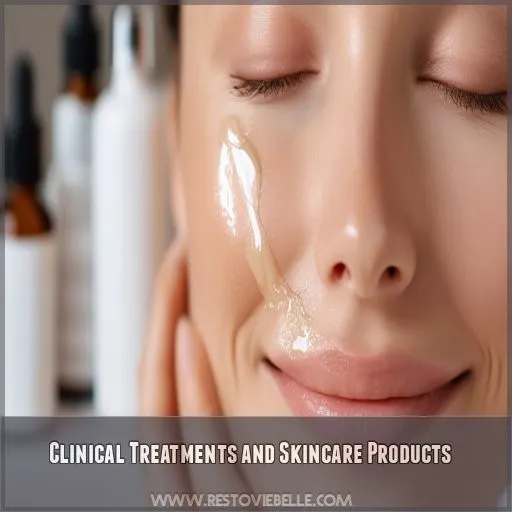This site is supported by our readers. We may earn a commission, at no cost to you, if you purchase through links.
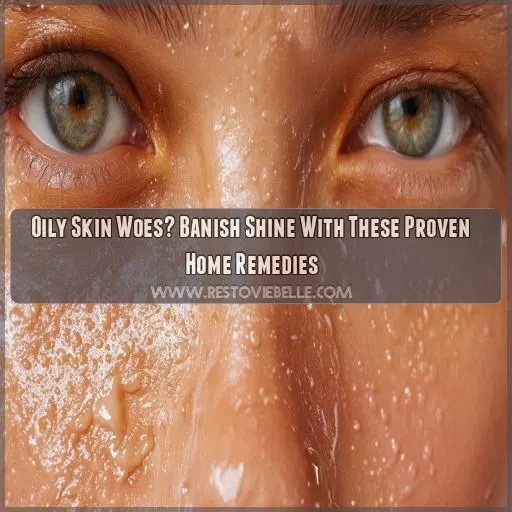 For most people, oily skin looks and feels like an aesthetic problem; others call it a daily battling process. Learning how to get rid of oily skin on the face from home will empower you to master your skincare routine.
For most people, oily skin looks and feels like an aesthetic problem; others call it a daily battling process. Learning how to get rid of oily skin on the face from home will empower you to master your skincare routine.
This article will tell you about effective home remedies and lifestyle adjustments that see duplicated results, together with powerful clinical treatments. You will think out practical, evidence-based ways by which you control the shine and keep your skin at bay.
Table Of Contents
- Key Takeaways
- How to Get Rid of Oily Skin on Face at Home?
- Understanding Oily Skin
- Signs and Symptoms of Oily Skin
- Root Causes of Oily Skin
- Prevention and Lifestyle Changes
- Home Remedies for Oily Skin
- Clinical Treatments and Skincare Products
- Seeking Medical Guidance
- Frequently Asked Questions (FAQs)
- How to get rid of oily face naturally?
- How do I stop my face from being so oily?
- How can I clean my face from oily skin naturally?
- Why is my face so oily?
- Can oily skin be cured permanently?
- Is oily skin common in men and women?
- How does diet impact oily skin?
- Are natural remedies safe for sensitive skin?
- Can oily skin change with age?
- Conclusion
Key Takeaways
- Tame that oily beast with green tea toners and DIY clay masks, and watch your skin shine (less)!
- Embrace the power of aloe vera and oatmeal, and feel your skin breathe a sigh of relief.
- Oil-free products and stress management are your secret weapons for a balanced complexion.
- Don’t be afraid to seek professional help if home remedies don’t cut it – your skin deserves the best!
How to Get Rid of Oily Skin on Face at Home?
Want to know how to get rid of oily skin on your face at home?
Start by washing with an oil-absorbing face wash twice daily, and choose oil-free skincare products to keep shine at bay. Manage your stress and tweak your diet; less greasy food can mean less greasy skin.
Home remedies like green tea toner, aloe vera gel, and DIY clay masks also work wonders. For a super-smooth finish, try an oats face mask or Fuller’s earth face pack.
Keep up with these habits, and you’ll see a noticeable difference.
Curious about more impactful tips and lifestyle changes?
Understanding Oily Skin
Oily skin results from overproduction by your sebaceous glands of sebum, the natural oil that keeps your skin hydrated and protected. This excessive production may be due to heredity or hormonal changes, but it strongly relates to environment and seasonal variation.
Your skincare is essential; hence, go for products meant for oily skin to help keep this problem at bay. On the other hand, stress management is equally essential as it triggers the production of sebum. Opt for oil-free as much as possible while applying makeup to avoid extra shine.
Regularity with your skincare, right from cleansing to moisturizing, will keep extra oiliness at bay and leave your skin smooth and balanced. Remember, understanding oily skin is the first step toward managing it.
Signs and Symptoms of Oily Skin
Oily skin can leave your face looking greasy and sweaty, often leading to enlarged pores, clogged pores, and breakouts. This condition can make makeup appear shiny and lead to excessive sweating, complicating your skincare routine.
Greasy and Sweaty Skin
Dealing with greasy and sweaty skin can be frustrating. Overactive sweat production and oily skin often lead to:
- A shiny complexion, affecting skin texture.
- Complications in makeup application, causing it to slip off.
- Increased pore visibility, which can heighten acne development.
Use a good cleanser, toner, and consider retinoids for better control and balance.
Enlarged Pores
Enlarged pores often accompany oily skin, making you more prone to blackheads and whiteheads. Excess sebum and dead skin can clog these pores, leading to acne. Incorporating salicylic acid products, using medicated pads, and lifestyle adjustments can help manage pore size. Clinical treatments like sonic cleansers also offer deeper purification.
| Treatment | Description | Effect |
|---|---|---|
| Salicylic Acid | Exfoliates and unclogs pores | Reduces blackheads |
| Medicated Pads | Absorbs oil and cleanses | Diminishes pore appearance |
| Sonic Cleansers | Deep cleaning mechanism | Clears pores |
| Retinoids | Reduces sebum production | Shrinks pores |
| Niacinamide | Controls oil excretion | Tightens pores |
Clogged Pores and Breakouts
Enlarged pores often lead to clogged follicles, causing breakouts. Excess sebum from your sebaceous glands mixes with dead skin, resulting in pore congestion and acne. You might notice blackheads and whiteheads forming, which can potentially cause acne scarring. Regular cleansing and using blotting papers help. For persistent issues, consider dermatologist-recommended isotretinoin for effective blackhead prevention and whitehead reduction.
Shiny Makeup and Excessive Sweating
Coming straight from breakouts, you’ll observe shiny makeup and excessive sweating if you have oily skin. This shine intensifies due to sun exposure and humidity, making it hard to keep up with wearing makeup. Combat these issues with strategic oily skin care. Improved ways of how to do this are explained below:
Apply a Mattifying Primer.
- Take an oily skin face wash.
- Choose an oily skin moisturizer.
- Remove your makeup properly every night.
Root Causes of Oily Skin
Oily skin often stems from genetic factors, hormonal fluctuations, and dietary influences. Understanding these root causes can help you manage and reduce excess shine effectively.
Genetic Predisposition Factors
Genetics play a key role in your skin type. Age and related changes, combined with genetic predisposition, majorly impact sebum production. You might inherit oily skin from your parents. Environmental influences also interact with your genes, causing internal factors to trigger excess oil. Genetic testing can provide insights, and treatments like oral contraceptives or niacinamide often help.
Hormonal Influences on Sebum
Hormonal imbalances powerfully affect how much sebum is produced and result in oily skin.
Your body goes through some shifts during puberty, pregnancy, and clearly with the menstrual cycle that drive up the oils within your body.
Some endocrine disorders can further contribute to it.
Management of these fluctuations with a targeted oily skin serum or an efficient oily skin mask is essential.
Simple oily skin home remedies and facial masks bring relief.
Dietary Effects on Skin
Your diet has a significant influence on oily skin. High-glycemic foods will increase your blood sugar, surging sebum production in your body.
Focus on fruits, vegetables, and whole grain food consumption. Avoid foods high in sugar and other fried and processed food servings.
Nutrient-rich diets work well with skincare routines like oily skin toner and mineral setting powder for collagen-rich skin.
Prevention and Lifestyle Changes
To manage oily skin, use oil-absorbing face washes and opt for oil-free skincare products. Making dietary adjustments and managing stress can also help reduce excess sebum production and shine.
Use Oil-Absorbing Face Washes
To tackle oily skin, start with oil-absorbing cleansers. These help control excess sebum. Look for face washes containing:
- Salicylic acid: This exfoliates and keeps pores clear.
- Benzoyl peroxide: Known for blemish control and anti-inflammatory properties.
- Charcoal: Absorbs oil efficiently.
These are practical steps in answering how to get rid of oily skin.
Opt for Oil-Free Skincare Products
Opt for water-based cleansers and noncomedogenic makeup to manage oily skin effectively. Oil-absorbing powders, salicylic acid pads, and medicated wipes can help control excess oil and prevent breakouts. These alternatives won’t clog your pores, reducing the chance of acne and keeping your skin matte. Choosing the right products creates a healthier, more balanced complexion.
Dietary Adjustments
Diet has a massive role in oily skin. Have a good diet that’s rich in low-carb, high-fiber-based foods, and avoid sugary snacks or high-glycemic foods that can elevate the level of your blood sugar as it boots the skin’s production of oils. Also, try to reduce dairy products since this is also a determinant of the amount of sebum produced by the body.
- Low-carb, high-fiber foods: Vegetables, whole grains
Avoid high-glycemic foods High-sugar, white bread
- Limit dairy: Milk, cheese
Stress Management
Stress management can benefit tremendously with oily skin. Engage in relaxation activities like yoga and meditation to calm your mind.
Breathing exercises will provide calmness to the mind, reducing stress and reducing sebum production in the body. Add this to your daily routine, and you’ll see a difference.
Stress reduction works magic, not only on your skin but on the whole well-being. Give it a try.
Home Remedies for Oily Skin
Struggling with oily skin? Try these proven home remedies to banish shine and keep your complexion looking fresh. From soothing green tea toners to nourishing aloe vera gel, these natural solutions can help you regain control of your skin’s oil production.
Green Tea Toner
Green tea toner is a practical remedy for oily skin. Its antioxidant properties fight free radicals, while anti-inflammatory effects reduce redness. This toner also soothes skin and tightens pores. To make it, steep green tea, cool it, and apply with a cotton pad. This simple DIY preparation offers an effective solution for oily skin management.
Aloe Vera Gel
Aloe vera gel, rich in medicinal properties, is excellent for oily skin. It combats skin inflammation due to its anti-inflammatory activity and boasts antioxidant and antibacterial effects. To apply:
- Extract fresh aloe vera gel.
- Apply a thin layer to your face.
- Let it dry for 10 minutes.
- Rinse with lukewarm water.
Enjoy the soothing, oil-free result!
DIY Clay Mask
A DIY clay mask is excellent for oily skin, providing a natural way to absorb excess oil. Mix bentonite or kaolin clay with water or apple cider vinegar. Apply evenly, let it dry for 10-15 minutes, and rinse with lukewarm water. Use this clay mask weekly to minimize pores, reduce sebum, and prevent breakouts.
Oats Face Mask
Oats face masks are a superb choice for soothing oily skin. Rich in anti-inflammatory properties, oats also balance sebum production while exfoliating effectively. Simply mix ground oats with water to form a paste and apply.
- Benefits:
- Exfoliation and cleansing
- Balancing oil levels
- Soothing inflammation
- Absorbent, reducing shine
Fuller’s Earth Face Pack
Fuller’s earth, known for its oil-absorbing properties, is a powerful addition to your skincare routine. This clay pack’s efficacy in controlling excess sebum makes it ideal for oily skin types. Mix Fuller’s earth with water to create a homemade mask, and apply it weekly. This DIY skincare remedy helps unclog pores, reduce shine, and leaves your skin feeling balanced.
Clinical Treatments and Skincare Products
To combat oily skin, you can use clinical treatments like retinoids and niacinamide, which help reduce sebum production. Additionally, skincare products containing L-carnitine can manage oil levels effectively, providing a more balanced complexion.
Use of Retinoids
Retinoids derived from vitamin A will help regulate sebum production and can, therefore, lower oiliness effectively. They’re often available in prescription strength for resistant cases but may cause skin sensitivity at the beginning of use. Start slowly to minimize side effects:
- Apply twice a week.
- Use pea-sized.
- Mix with moisturizer.
- Consult a dermatologist if the medication is required for long-term use.
These steps provide the best results.
Niacinamide for Oil Reduction
Niacinamide, a form of vitamin B3, works wonders for reducing skin oil. It helps control sebum production, minimizing shine and pore visibility. Clinical studies have shown its efficacy in acne prevention and skin texture improvement. Incorporate niacinamide into your routine with serums or moisturizers to achieve a balanced, matte complexion without the greasy feel.
L-carnitine for Managing Oily Skin
L-carnitine can effectively manage oily skin. It regulates sebum production, reducing the greasy shine and preventing acne breakouts. Scientific studies show that L-carnitine also helps control inflammation, leading to clearer skin over time.
- Sebum Regulation: Keeps oil production in check.
- Acne Reduction: Minimizes breakouts.
- Inflammation Control: Calms irritated skin.
- Clinical Evidence: Backed by scientific research.
Recommended Skincare Products
For managing oily skin, use oil-free moisturizers to keep your skin hydrated without extra shine. Mattifying primers will help control shine before makeup. Opt for noncomedogenic makeup to avoid clogged pores. Salicylic acid products gently exfoliate and clear out excess oil. Keep blotting papers handy for quick touch-ups throughout the day.
Seeking Medical Guidance
If home remedies aren’t effective, one has to consider a visit to the doctor for professional advice. If oily skin persists, an underlying issue may be at stake that requires medical intervention. A doctor will be able to evaluate your skin, with some possible warning signs being:
- Severe acne: Painfully persistent breakouts that come and go and prove unresponsive to over-the-counter meds.
- Medication options : Prescription treatments, such as oral contraceptives or retinoids, can help balance your hormones and reduce excess oil production.
Underlying conditions: Conditions, such as polycystic ovary syndrome, could lead to excess oil production, hence needing tailor-made care.
- Skin sensitivity: If your kind of skin reacts negatively to home remedies, the doctor can energetically recommend other safer alternatives.
Don’t be afraid to go to the dermatologist. Early intervention can keep you from long-term problems and guarantee a clear, healthful skin look.
Frequently Asked Questions (FAQs)
How to get rid of oily face naturally?
To get rid of an oily face naturally, wash it twice daily with a gentle cleanser, apply aloe vera gel, use DIY clay masks, and incorporate an oatmeal face mask to exfoliate and reduce excess oil.
How do I stop my face from being so oily?
To control oily skin, wash your face twice daily with oil-absorbing cleansers, use oil-free skincare products, and apply a green tea toner. Regularly exfoliate and moisturize with noncomedogenic products to keep your skin balanced.
How can I clean my face from oily skin naturally?
Did you know 75% of people experience oily skin at some point? Use a green tea toner after washing your face. Its antioxidants help reduce sebum production, leaving your skin clearer and less oily.
Why is my face so oily?
Your face may be oily due to genetics, hormonal changes, stress, overproduction of sebum, or diet. Identifying the root cause helps manage it effectively with appropriate skincare, diet, and lifestyle adjustments.
Can oily skin be cured permanently?
Permanently curing oily skin isn’t feasible due to genetic and hormonal factors. However, you can manage it effectively through consistent skincare, a balanced diet, and using noncomedogenic, oil-free products to maintain a matte, healthy complexion.
Is oily skin common in men and women?
Yes, oily skin is common in both men and women. Hormonal changes, genetics, and lifestyle factors contribute to its prevalence across genders, making it a universal concern. Regular skincare can help manage and reduce oiliness.
How does diet impact oily skin?
Diet does play a vital role in oily skin. Fried, sweet, and processed foods will ensure that the production of oils in your body is increased. Low-glycemic meals rich in fruits, vegetables, and lean proteins could help keep sebum levels at bay.
Are natural remedies safe for sensitive skin?
Yes, natural remedies can be safe for sensitive skin if chosen carefully. Opt for gentle ingredients like aloe vera and oatmeal, and always do a patch test to avoid potential reactions or irritation.
Can oily skin change with age?
Imagine sebum production like a teenager’s rollercoaster; it peaks in adolescence and often stabilizes with age. While genetics, hormones, and lifestyle influence oily skin, many find their skin balances itself over time.
Conclusion
Mastering oily skin can feel a lot like taming a wild beast.
Knowing how to remove oily skin on your face at home will arm you with effective remedies and practical adjustments.
Think green tea toners and aloe vera with DIY masks, oil-free products, and stress management.
Back these up with clinical treatments when required, and you’ll have healthy and balanced skin.
Consider professional advice for personalized skincare at all times.
